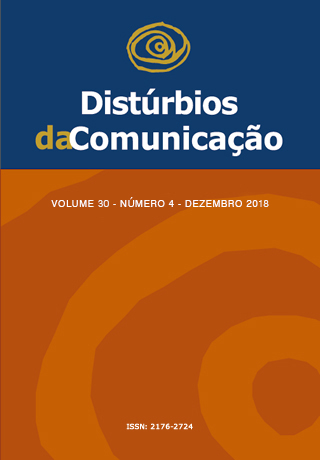Phonological processing: comparison between children with and without phonological disorder
DOI:
https://doi.org/10.23925/2176-2724.2018v30i4p637-646Keywords:
Evaluation, Speech, Language and Hearing Sciences, Child Language, Speech Sound Disorder.Abstract
Introduction: Phonological disorder (TF, in Portuguese) is the failure to use speech sounds expected for the stages of development. Among the factors related to the development of oral language, there is phonological processing (PF, in Portuguese), formed by the abilities of lexical access, phonological memory and phonological awareness. Objective: To compare the performance of PF in children with and without TF, as well as to correlate PF skills with each other and with total phonological processing (PFT, in Portuguese). Method: Cross-sectional observational study. Twenty children between 5 years and 8 years old, boys and girls, were separated in the Research Group (GP) and Control Group (CG), respectively, in the presence or absence of TF. An evaluation of the abilities of the PF was performed with Quick Nomination Test, Brazilian Children’s Test of Pseudoword Repetition and Phonological Consciousness Test. The data were analyzed statistically. Results: It was observed a higher prevalence of TF in males. The groups were statistically different in the lexical access, phonological memory and PFT abilities, with better performance for the GC. In GP, correlations were observed between the abilities of the PF, with the exception of phonological memory, which did not present correlation with age and phonological awareness. In GC, correlations between abilities were also observed, except for access to the lexicon, which showed correlation only with PFT. Conclusion: The GP children presented worse performance in the PF tests, except in phonological awareness, where the groups presented similar performances. PF skills showed correlations with each other, with some exceptions.Downloads
Downloads
Published
Issue
Section
License
Copyright (c) 2018 Renata Rodrigues de Andrade Silva, Elisa Maria Santos Balbino, Thaís Nobre Uchôa Souza, Ranilde Cristiane Cavalcante Costa

This work is licensed under a Creative Commons Attribution 4.0 International License.









